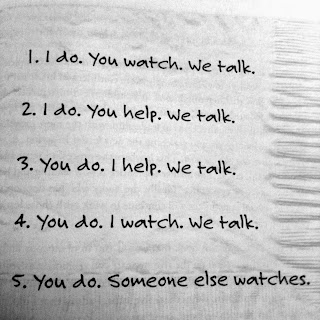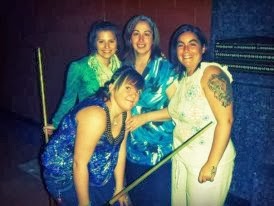Intentional Ignorance
“Somewhere along the line you’ve got to do your apprenticeship. But I’d want half a chance of being successful at it.”
Alan Shearer
“There is no easy way to train an apprentice. My two tools are example and nagging.”
Lemony Snicket, Who Could That Be At This Hour?
I realize it has been a silent week. I’ve been busy with life and living and so this virtual world of words became devoid of my regular witticisms and “gotcha” expressions about the world around me.
But here I am, back in the saddle, and ready to canter off on some quixotic verbal adventure, hoping to drag you along with me to "tilt at windmills" and generally fill the virtual world with yet more words…..
The quixotic "windmill tilting" of today is the topic of “apprenticeship" and how we master the things in life that are worthy of being called wise, and/or useful.
There was a time in human history when most people experienced a long season of being an apprentice. Whatever your position, your community wanted to ensure you were actually able to competently perform the tasks an interdependent community required you to perform, so that the whole community could both survive and perhaps thrive. Apprenticeship was one of the first rungs on the lofty ladder of mastering a vocation but it was one of the foundational rungs in climbing the lofty ladder to a fulfilling life.
Today we can focus so much on accreditation that we often fail to ensure we have competently transmitted the actual education we initially set out to give the student. I’ve met far too many people with impressive accreditations who are almost devoid of practical education in the field they desire to labor in. Colleges and Institutes of Higher Learning hand out pieces of paper claiming that their students are now “masters” when they have practically no marketable experience in their chosen field beyond the theoretical. Their first employer is expected to fill in the glaring holes of ineptitude and inexperience while pretending to these newly minted “masters” that they are profoundly qualified and deeply valued within their new field of endeavor.
Most of the important things in life that we need to learn have to be taught experientially as well as theoretically. Sadly, most of these essential life lessons are now omitted from the curriculum of life and are at best an elective that one can attend in pajamas and a hangover without any fear of actually flunking the class.
The image at the top of this post lays out the ancient way we humans have learned things. Whether that was how to tie our own shoe laces or in building a rocket to Mars we used some version of the five steps….
Yesterday I talked to a young man who has been walking with me through these five apprenticeship steps…. It became apparent in the midst of that conversation that it might be time I stopped “watching” and allowed another to begin “watching” him being a master of his craft…. When the person teaching someone how to master something stops “watching” it allows that person to begin to “teach” the next person in line how to master the same thing.
I love the symmetry inherent in this ancient system of learning.
1. Someone joins themselves to a person they respect and becomes an apprentice seeking to master something that the other person clearly possesses mastery of.
2. Through a process of walking experientially through life, ensuring sufficient time is set aside to discuss the “explanations” of what is experienced the student begins to gain both confidence and competency in the subject.
3. Inevitably if the student is sufficiently competent and committed they will gain a mastery over the subject.
4. At that point the teacher can move on, leaving behind a newly minted master teacher who not only knows how to do something with excellence, but also how to teach that something to another person.
5. The newly minted “master” and the old “master” are now able to take two new apprentices and begin the journey of discovering mastery in the desired field.
For many people today this ancient model seems too simple and too fraught with potential flaws to be considered sufficiently trustworthy to ensure those who come out the other end are actually “qualified” to do what it is we need them to do. So we modernized our teaching and training to focus on theoretical learning. If they can answer certain questions for which they were able to memorize the answers, we will call them qualified. That their steely focus on training themselves to regurgitate facts accurately often ensured they didn’t have the required time to discover “why" the answers were correct. But for the sake of modernization we decide this is just a small price to pay for streamlining the antiquated model of apprenticeship into our modern marvel of accreditation.
Theory is essential to learning, but it is just a portion of the process of learning. Functional incompetents with an excess of accreditations are highly unlikely to be able to do anything until they find someone who is willing to train them in the practical applications of their theoretical accreditations.
Robert Millar’s 5 steps to mastery….
1. Believe that you are ignorant in the field you wish to master
2. Believe someone else isn’t ignorant in that field
3. Walk alongside that enlightened person and watch them be a "master"
4. Get them to tell you what they did and why they did it, then get them to let you try it too, repeat process until mastery is consistently obtained.
5. When that enlightened person tells you that you are no longer ignorant start looking for another ignorant person to enlighten.
This is how I mastered things in my life, and also how I help others master those same things in their life. It isn’t rocket science and even when it is, it is still this simple…. watch, wonder, work, wonder, watch, work…..
The simplistic thoughts of an Irishman…. but the young man I saw yesterday is very near to being a recognized experiential master in a field most people find almost unimaginably difficult to master… more spectacular is the fact that he is almost ready to teach another “ignorant" person how to master what he has just mastered.
What do you think?



Comments
Post a Comment